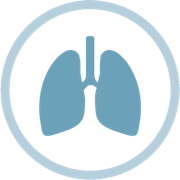Keep Up the Conversation
Communicating With Your Care Team
It’s extremely important to stay in contact with your healthcare provider(s).
Communicating regularly will help them monitor your disease progression, manage any symptoms you may be experiencing, and connect you with information and resources you may need.
Communicating regularly will help them monitor your disease progression, manage any symptoms you may be experiencing, and connect you with information and resources you may need.
Your loved ones are also a vital source of support. They can help assist you with physically demanding tasks and also serve as an emotional lifeline.
Enhancing Quality of Life
Learn About Helpful Interventions
As ALS progresses, the muscles that help with certain functions like eating and breathing can weaken, making these tasks particularly challenging. Not only are these functions necessary to maintain your quality of life, but they also can reduce your survival time if not managed properly.
Below are some interventions you can choose to stay ahead of your disease. It’s important to remember that, before making any lifestyle changes, you should first speak with your healthcare provider(s).
Below are some interventions you can choose to stay ahead of your disease. It’s important to remember that, before making any lifestyle changes, you should first speak with your healthcare provider(s).

Why It’s Important:
Malnutrition affects people with ALS. The main cause of malnutrition is difficulty swallowing due to a weakness in the muscles that involve swallowing or chewing food.
Taking the Right Steps:
If you can still chew and swallow safely, consume foods and liquids high in calories and high in protein.
If eating and drinking are considered unsafe, your healthcare team may consider a percutaneous endoscopic gastrostomy (PEG) tube, which is a small tube that is inserted directly into the stomach to provide a means of delivering food, liquid, and medications. Most people find PEG tubes much more comfortable and convenient than they originally thought.
Malnutrition affects people with ALS. The main cause of malnutrition is difficulty swallowing due to a weakness in the muscles that involve swallowing or chewing food.
Taking the Right Steps:
If you can still chew and swallow safely, consume foods and liquids high in calories and high in protein.
If eating and drinking are considered unsafe, your healthcare team may consider a percutaneous endoscopic gastrostomy (PEG) tube, which is a small tube that is inserted directly into the stomach to provide a means of delivering food, liquid, and medications. Most people find PEG tubes much more comfortable and convenient than they originally thought.

Why It’s Important:
As the muscles involved in respiration (breathing) weaken, it becomes harder to breathe. Symptoms may include gasping for air, fatigue, frequent yawning, morning headache, insomnia, and difficulty lying flat. Respiratory failure is the leading cause of death in ALS, so it's important to intervene early.
Taking the Right Steps:
Noninvasive ventilation (NIV) can assist with breathing by using air to expand the lungs. This can be done via a face mask or nasal pillow and is intended as part-time respiratory support. Starting NIV earlier as opposed to later, when respiratory function worsens, has been shown to prolong survival.
Many people eventually require invasive ventilation that supports the entire respiratory system. This form of respiration requires the surgical insertion of a tracheostomy tube into the neck.
As the muscles involved in respiration (breathing) weaken, it becomes harder to breathe. Symptoms may include gasping for air, fatigue, frequent yawning, morning headache, insomnia, and difficulty lying flat. Respiratory failure is the leading cause of death in ALS, so it's important to intervene early.
Taking the Right Steps:
Noninvasive ventilation (NIV) can assist with breathing by using air to expand the lungs. This can be done via a face mask or nasal pillow and is intended as part-time respiratory support. Starting NIV earlier as opposed to later, when respiratory function worsens, has been shown to prolong survival.
Many people eventually require invasive ventilation that supports the entire respiratory system. This form of respiration requires the surgical insertion of a tracheostomy tube into the neck.
Tips for Managing ALS*
You’re not defined by your ALS. These tips may help you cope with and manage your disease.

Set personal goals
Decide which goals and aspirations are most important to you, and stick to them. Concentrate on the people and things you love.
Decide which goals and aspirations are most important to you, and stick to them. Concentrate on the people and things you love.

Ask for help
If you ever have a question or need help with a task, don't hesitate to ask your healthcare provider(s) and/or caregiver.
If you ever have a question or need help with a task, don't hesitate to ask your healthcare provider(s) and/or caregiver.

Plan your next steps
Before leaving the house, always double check you have what you need to be prepared.
Before leaving the house, always double check you have what you need to be prepared.

Stay social
Surround yourself with family, friends, and the things you love.
Surround yourself with family, friends, and the things you love.

Customize your home
Consider modifying your home to be more accessible and easier to navigate.
Consider modifying your home to be more accessible and easier to navigate.

Explore assistive devices
There are many types of equipment that can help you maintain your independence for longer and be more comfortable.
There are many types of equipment that can help you maintain your independence for longer and be more comfortable.

Consider your mental health
A trained professional can help you and your loved ones cope with any emotions you're feeling.
A trained professional can help you and your loved ones cope with any emotions you're feeling.
Speak with your healthcare provider(s) about ALS organizations and support groups available online and in your area.
*The information and advice provided here are general in nature and are not intended to be a substitute for professional medical advice or diagnosis. You are strongly encouraged to seek the advice of your doctor or other qualified healthcare provider with any questions regarding a medical condition.
Treatment Options
ALS Clinics




